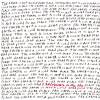 This album is very deceptively packaged and presented, but in the best way possible: the tame cover art and the word "folk" did nothing at all to prepare me for the extremely fun and quirky pseudo-surf gems within.  Of course, many of these pieces were originally folk songs, but they have been so jazzed-up with kitschy organs and twangy, tremelo-happy guitars as to make that term a wildly misleading understatement. Curator Stuart Ellis has assembled an improbable monster of a compilation.
This album is very deceptively packaged and presented, but in the best way possible: the tame cover art and the word "folk" did nothing at all to prepare me for the extremely fun and quirky pseudo-surf gems within.  Of course, many of these pieces were originally folk songs, but they have been so jazzed-up with kitschy organs and twangy, tremelo-happy guitars as to make that term a wildly misleading understatement. Curator Stuart Ellis has assembled an improbable monster of a compilation.
Two new shows just for you. We have squeezed out two extended release episodes for this weekend to get you through this week. They contain mostly new songs but there's also new issues from the vaults. The first show features music from Rider/Horse, Mint Field, Robert Aiki Aubrey Lowe, Anastasia Coope, ISAN, Stone Music, La Securite, Bark Psychosis, Jon Rose, Master Wilburn Burchette, Umberto, Wand, Tim Koh, Sun An, and Memory Drawings. The second episode has music by Laibach, Melt-Banana, Chuck Johnson, X, K. Yoshimatsu, Dorothy Carter, Pavel Milyakov, Violence Gratuite, Mark Templeton, Dummy, Endon, body / negative, Midwife, Alberto Boccardi, Divine. Cow in Maui from Veronika in Vienna. Get involved: subscribe, review, rate, share with your friends, send images! |



 Perhaps uniquely, Basil Kirchin’s appreciators include Broadcast, Coil, Sean Connery, Elizabeth Taylor, Brian Eno, and Nurse With Wound. Included here is music from his first film score Primitive London (1965) and the gangland movie The Freelance (1971). Kirchin was a pioneering twentieth-century master of texture and mood. His inventive, multifaceted music still sounds light yet off-kilter, eerie yet peaceful, both futuristic and nostalgic.
Perhaps uniquely, Basil Kirchin‚Äôs appreciators include Broadcast, Coil, Sean Connery, Elizabeth Taylor, Brian Eno, and Nurse With Wound. Included here is music from his first film score Primitive London (1965) and the gangland movie The Freelance (1971). Kirchin was a pioneering twentieth-century master of texture and mood. His inventive, multifaceted music still sounds light yet off-kilter, eerie yet peaceful, both futuristic and nostalgic. The first offering in four years from folk-rockjourneyman David Berman could easily have become a messy affair. Afteryears of booze, drugs, depression, and more booze, it seemed Berman waspoised to make the all important recovery record. It's a familiar one—it reeks of sorrow, redemption, and rehab—but Bermanknows he’s better than that, and as a result he’s peppered the newSilver Jews record with strange but brilliantly told tales of boozers,black Santa Clauses, and airport bartenders.
The first offering in four years from folk-rockjourneyman David Berman could easily have become a messy affair. Afteryears of booze, drugs, depression, and more booze, it seemed Berman waspoised to make the all important recovery record. It's a familiar one—it reeks of sorrow, redemption, and rehab—but Bermanknows he’s better than that, and as a result he’s peppered the newSilver Jews record with strange but brilliantly told tales of boozers,black Santa Clauses, and airport bartenders. It's an attractive package on the most base level. The liner notes claim, "Desire is the root of all suffering," and the artwork depicts a woman, possibly a prostitute, in some form of bondage. Paired with the rather bleak photographs of nondescript locales, the entire album screams before it ever begins playing. This stuff is vile: the album is dirty, absolutely filthy, and exciting.
It's an attractive package on the most base level. The liner notes claim, "Desire is the root of all suffering," and the artwork depicts a woman, possibly a prostitute, in some form of bondage. Paired with the rather bleak photographs of nondescript locales, the entire album screams before it ever begins playing. This stuff is vile: the album is dirty, absolutely filthy, and exciting. Somewhere there exists a Metal Valhalla, an otherworldly paradise where all of the head-banging Vikings, beer-swilling Satanists, fist-pumping Klingons and face-painted Odinists are slam-dancing under the dark crimson moonlight to the pure amplified glory of the heaviest sounds in the Universe. For all we know, this Guitar Nirvana might be completely out of reach of mere mortals, at least in this lifetime, but that doesn't stop people from trying time and again to invoke it right here on Earth.
Somewhere there exists a Metal Valhalla, an otherworldly paradise where all of the head-banging Vikings, beer-swilling Satanists, fist-pumping Klingons and face-painted Odinists are slam-dancing under the dark crimson moonlight to the pure amplified glory of the heaviest sounds in the Universe. For all we know, this Guitar Nirvana might be completely out of reach of mere mortals, at least in this lifetime, but that doesn't stop people from trying time and again to invoke it right here on Earth. While their debut album was equal parts all-out guitar assault and plaintive resignation, Explosions in the Sky plumbs the depths of their oeuvre by digging within on their second record, even in its first moments. The quietly played notes that begin the first track eventually join with a heartbeat of percussion that builds into a carefully blended swell where all instruments feel like they're being played with someone's life on the line. When it all finally combusts, it's not at all like before: it's better.
While their debut album was equal parts all-out guitar assault and plaintive resignation, Explosions in the Sky plumbs the depths of their oeuvre by digging within on their second record, even in its first moments. The quietly played notes that begin the first track eventually join with a heartbeat of percussion that builds into a carefully blended swell where all instruments feel like they're being played with someone's life on the line.¬†When it all finally combusts, it's not at all like before: it's¬†better. If brevity is the soul of wit, then the 99 remixes of Cock ESP on Hurts So Goodmust be the wittiest music ever produced. Close to none of these songsexceed the two-minute mark, most of them averaging about 30-45 seconds.It's an album tailor made for noise lovers with ADD. Cock ESP isanother one of those aggro-noise outfits with a wicked sense of humorand a predilection for transgressive fun. V/VM Test records iscertainly an appropriate label for this stuff, as much of their humorderives from brutal parodies of pop music and pun-filled song titles,poking fun at pop culture clichés and other easy targets. Thisadolescent satire has the potential to wear out its welcome quickly,but when it comes in such tiny little disposable half-minute packages,it's hard to resist. Just reading down the list of the 88 band namesand 99 song titles that make up the album is a fucking riot. A samplingof some of the more ridiculous band names: The Edible Scab Package, DJEnormous Genitals, U Can Unlearn Guitar, Obscuration/Albee Featuringthe Mellow Oaks First Grade Choir, Uncle Fatso, Kid666 and DJSmallcock. The song titles: "Don't Stop Bleedin'," "The Pursuit ofCrappiness," "Enjoy the Violence," and "Hologram of Balls." The musicruns the gamut — mutated voices, perversions of pop music, sampledmedia cut-ups, harsh blasts of industrial noise, aggressive drill n'bass techno, clarinet solos, a children's choir, field recordings anddrugged-up fucking about — some of it hilarious, all of it annoying,but certainly that was the intention. As an unexpected side effect,listening to this disc on random repeat mode all afternoon has given methe strange ability to read the minds of people's genitals. In fact,your dick just told me that it wants this CD. -
If brevity is the soul of wit, then the 99 remixes of Cock ESP on Hurts So Goodmust be the wittiest music ever produced. Close to none of these songsexceed the two-minute mark, most of them averaging about 30-45 seconds.It's an album tailor made for noise lovers with ADD. Cock ESP isanother one of those aggro-noise outfits with a wicked sense of humorand a predilection for transgressive fun. V/VM Test records iscertainly an appropriate label for this stuff, as much of their humorderives from brutal parodies of pop music and pun-filled song titles,poking fun at pop culture clichés and other easy targets. Thisadolescent satire has the potential to wear out its welcome quickly,but when it comes in such tiny little disposable half-minute packages,it's hard to resist. Just reading down the list of the 88 band namesand 99 song titles that make up the album is a fucking riot. A samplingof some of the more ridiculous band names: The Edible Scab Package, DJEnormous Genitals, U Can Unlearn Guitar, Obscuration/Albee Featuringthe Mellow Oaks First Grade Choir, Uncle Fatso, Kid666 and DJSmallcock. The song titles: "Don't Stop Bleedin'," "The Pursuit ofCrappiness," "Enjoy the Violence," and "Hologram of Balls." The musicruns the gamut — mutated voices, perversions of pop music, sampledmedia cut-ups, harsh blasts of industrial noise, aggressive drill n'bass techno, clarinet solos, a children's choir, field recordings anddrugged-up fucking about — some of it hilarious, all of it annoying,but certainly that was the intention. As an unexpected side effect,listening to this disc on random repeat mode all afternoon has given methe strange ability to read the minds of people's genitals. In fact,your dick just told me that it wants this CD. -  The immediate reaction I had to my first airing of this CD is probablyquite common: It's impossible, at first, to believe that this isgenuine. Thankfully, the intensity and craftsmanship of the music lenda great deal of credibility, and after repeat listens I am less andless inclined to challenge the band on whether or not their hearts aretruly in this. I grew up listening to Slayer, Anthrax, and Metallica,sporting the worst mullet on the planet and a backpatch on my denimjacket to strike fear into all those who opposed. As I grew older, Igot into Yes, Dream Theater, and even some King Crimson, and learnedhow expansive one could make rock sound. Nightfist have taken the worksof these and other collective metal and prog-rock influences andbettered them, even if only here and there on their first release. Iftheir bio is indeed true and Nightfist's members are recent high schoolgraduates, then color me doubly impressed, as there's not one slip-upis to be found in these louder-than-love anthemic passages, and thatkind of skill is rare on music so technically precise as this. Theprologue and epilogue come off a bit forced, like an afterthought,detailing the warrior's journey in two brief monologues; thankfullythey let the music do most of the talking. Furious drumming, blazingguitars and mad-scientist keyboards abound, and the songs take on alife of their own. I saw the warrior, put upon by so much strife,swinging his sword and crushing enemies with one blow, striving towardsthe final battle. The entire CD is a metaphor for this up and comingband, and at this rate they'll be the stuff of legends sooner ratherthan later.
The immediate reaction I had to my first airing of this CD is probablyquite common: It's impossible, at first, to believe that this isgenuine. Thankfully, the intensity and craftsmanship of the music lenda great deal of credibility, and after repeat listens I am less andless inclined to challenge the band on whether or not their hearts aretruly in this. I grew up listening to Slayer, Anthrax, and Metallica,sporting the worst mullet on the planet and a backpatch on my denimjacket to strike fear into all those who opposed. As I grew older, Igot into Yes, Dream Theater, and even some King Crimson, and learnedhow expansive one could make rock sound. Nightfist have taken the worksof these and other collective metal and prog-rock influences andbettered them, even if only here and there on their first release. Iftheir bio is indeed true and Nightfist's members are recent high schoolgraduates, then color me doubly impressed, as there's not one slip-upis to be found in these louder-than-love anthemic passages, and thatkind of skill is rare on music so technically precise as this. Theprologue and epilogue come off a bit forced, like an afterthought,detailing the warrior's journey in two brief monologues; thankfullythey let the music do most of the talking. Furious drumming, blazingguitars and mad-scientist keyboards abound, and the songs take on alife of their own. I saw the warrior, put upon by so much strife,swinging his sword and crushing enemies with one blow, striving towardsthe final battle. The entire CD is a metaphor for this up and comingband, and at this rate they'll be the stuff of legends sooner ratherthan later.  The future of indie rock mixed with electrorock funk is definitely indoubt. Black Audio are a Finnish pop outfit with a mission to be thebest club band ever, or so it seems listening to their slickproductions on this release. The sad thing is that their beats arederivative, and every track is ruined by the mispronunciation of aword, or a strange effect that throws everything out of balance. Thereis a lot of creativity in their music, no question there, but it hasvery little substance that can be called originality. This single,composed of one undisturbed track off their debut album and two remixedversions of album tracks, is enough to give a taste of the band andtheir flavor, but there is precious little here that would give me anycause to want to listen to their full-length at all. "Louisiana" iskeyboard funk with scratch guitar and a steady programmed beat, butit's crippled by the flatulent keyboard bassline, and the repeatedphrasing of "Yamaha" as "Ya-MAH-ha." "Rock 'N' Roll Egos" starts offfairly strong, with a labored rhythm and guitar bend, but it's thelyrics that ultimately do this one in, as well: "Yeah I hate therednecks, dislike hipsters even more/Getting along with mean morons forthe sake of business makes me a whore." It just shows that subjectmatter only gets you halfway there; next you have to carry the conceptto the masses on your words and feelings. Maybe something is lost inthe translation here, and that's part of the problem. "Mockba 1980" isa tribute to Finnish Olympic medal winners of the past, but the remixhere just plods at first, then annoys at the end with its blandkeyboard sounds and rapid-fire for no reason beat. It's a good attempt,and maybe there would be more on the full-length for me to enjoy. Withthis as an appetizer, though, I have very little stomach for the maincourse.
The future of indie rock mixed with electrorock funk is definitely indoubt. Black Audio are a Finnish pop outfit with a mission to be thebest club band ever, or so it seems listening to their slickproductions on this release. The sad thing is that their beats arederivative, and every track is ruined by the mispronunciation of aword, or a strange effect that throws everything out of balance. Thereis a lot of creativity in their music, no question there, but it hasvery little substance that can be called originality. This single,composed of one undisturbed track off their debut album and two remixedversions of album tracks, is enough to give a taste of the band andtheir flavor, but there is precious little here that would give me anycause to want to listen to their full-length at all. "Louisiana" iskeyboard funk with scratch guitar and a steady programmed beat, butit's crippled by the flatulent keyboard bassline, and the repeatedphrasing of "Yamaha" as "Ya-MAH-ha." "Rock 'N' Roll Egos" starts offfairly strong, with a labored rhythm and guitar bend, but it's thelyrics that ultimately do this one in, as well: "Yeah I hate therednecks, dislike hipsters even more/Getting along with mean morons forthe sake of business makes me a whore." It just shows that subjectmatter only gets you halfway there; next you have to carry the conceptto the masses on your words and feelings. Maybe something is lost inthe translation here, and that's part of the problem. "Mockba 1980" isa tribute to Finnish Olympic medal winners of the past, but the remixhere just plods at first, then annoys at the end with its blandkeyboard sounds and rapid-fire for no reason beat. It's a good attempt,and maybe there would be more on the full-length for me to enjoy. Withthis as an appetizer, though, I have very little stomach for the maincourse.
